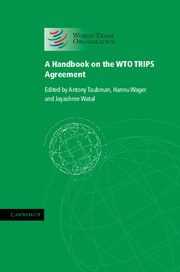Book contents
- Frontmatter
- Contents
- Figures
- Boxes
- Tables
- Preface
- Acknowledgements
- Acronyms and abbreviations
- I Introduction to the TRIPS Agreement
- II Copyright and related rights
- III Trademarks
- IV Geographical indications
- V Patents
- VI Industrial designs, layout-designs of integrated circuits, undisclosed information, anti-competitive practices
- VII Enforcement
- VIII Dispute prevention and settlement
- IX TRIPS and Public Health
- X Current TRIPS issues
- Appendix 1 Guide to TRIPS notifications
- Appendix 2 Guide to TRIPS documents
- Annexes TRIPS Handbook
- Index
VII - Enforcement
Published online by Cambridge University Press: 05 May 2012
- Frontmatter
- Contents
- Figures
- Boxes
- Tables
- Preface
- Acknowledgements
- Acronyms and abbreviations
- I Introduction to the TRIPS Agreement
- II Copyright and related rights
- III Trademarks
- IV Geographical indications
- V Patents
- VI Industrial designs, layout-designs of integrated circuits, undisclosed information, anti-competitive practices
- VII Enforcement
- VIII Dispute prevention and settlement
- IX TRIPS and Public Health
- X Current TRIPS issues
- Appendix 1 Guide to TRIPS notifications
- Appendix 2 Guide to TRIPS documents
- Annexes TRIPS Handbook
- Index
Summary
Introduction
The purpose of this chapter is to introduce the key features of the provisions of Part III, Sections 1 to 5, of the TRIPS Agreement entitled ‘Enforcement of Intellectual Property Rights’. This part of the Agreement elaborates in twenty-one articles the enforcement procedures that Members have to make available to permit prompt and effective action against infringements of IPRs covered by the TRIPS Agreement. It is divided into five sections:
general obligations (Article 41);
civil and administrative procedures and remedies (Articles 42 to 49);
provisional measures (Article 50);
special requirements related to border measures (Articles 51 to 60); and
criminal procedures (Article 61).
Unlike the substantive standards for the protection of IPRs in Part II of the TRIPS Agreement, which draws extensively on the existing body of international IP law, Part III incorporates only a few relevant provisions from earlier treaties; these are mentioned briefly below.
Background
Concerns in the multilateral trading system about counterfeiting and piracy and the perception that the international IPR system lacked effective rules on enforcement pre-dated the negotiations on the TRIPS Agreement. As seen in Chapter I, a proposal on trade in counterfeit goods was developed in the GATT, in 1978, as part of the Tokyo Round of trade negotiations, but no agreement was reached at that time. Subsequent work led to the inclusion of a specific mandate on IPRs in the Uruguay Round negotiations, which included a call for the development of a multilateral framework of principles, rules and disciplines dealing with international trade in counterfeit goods. When adopted, the TRIPS Agreement was the first multilateral treaty with detailed rules on the enforcement of IPRs, although earlier IP treaties, notably the Paris and Berne Conventions, do have some provisions specifically on enforcement.
- Type
- Chapter
- Information
- A Handbook on the WTO TRIPS Agreement , pp. 135 - 154Publisher: Cambridge University PressPrint publication year: 2012



